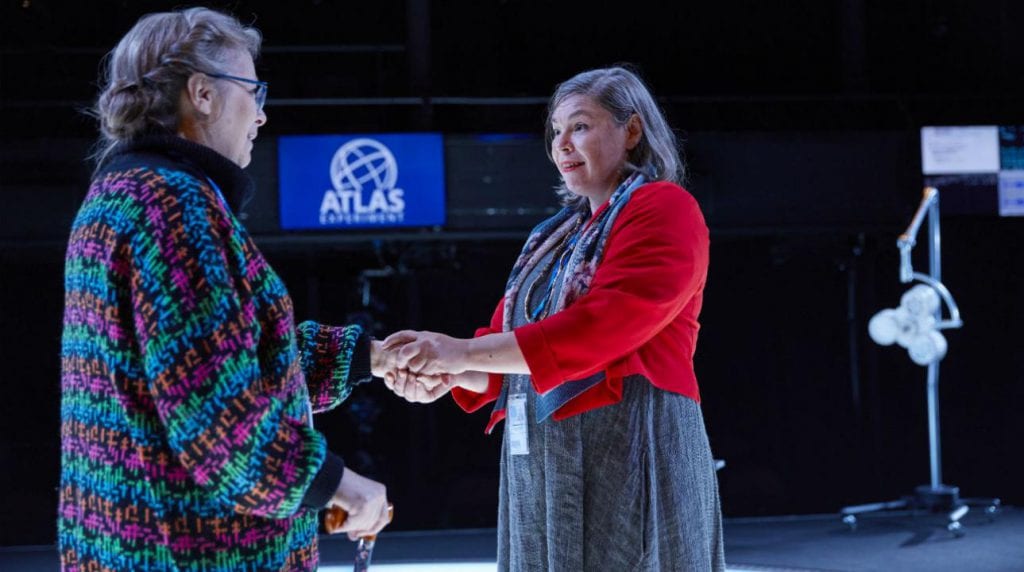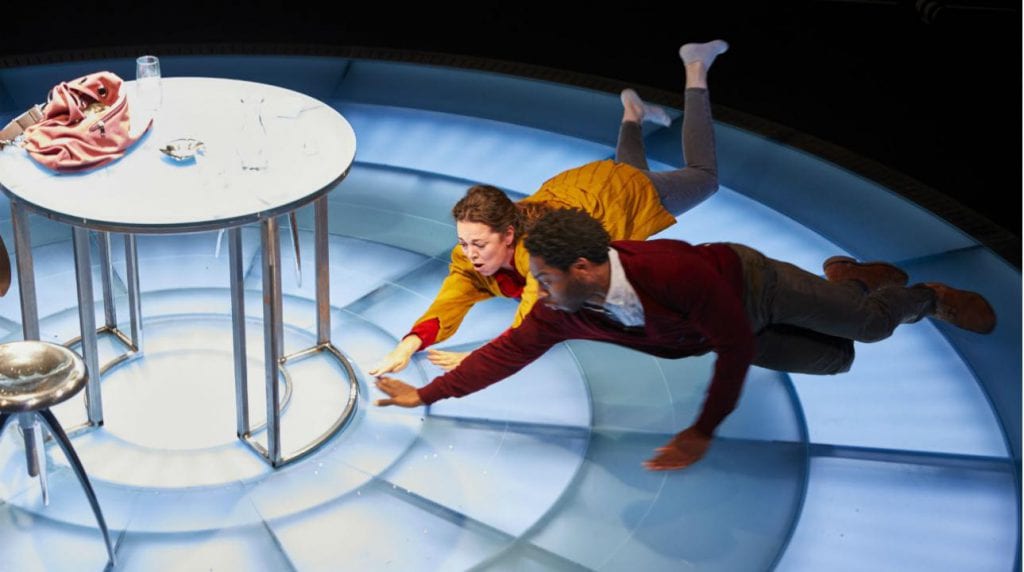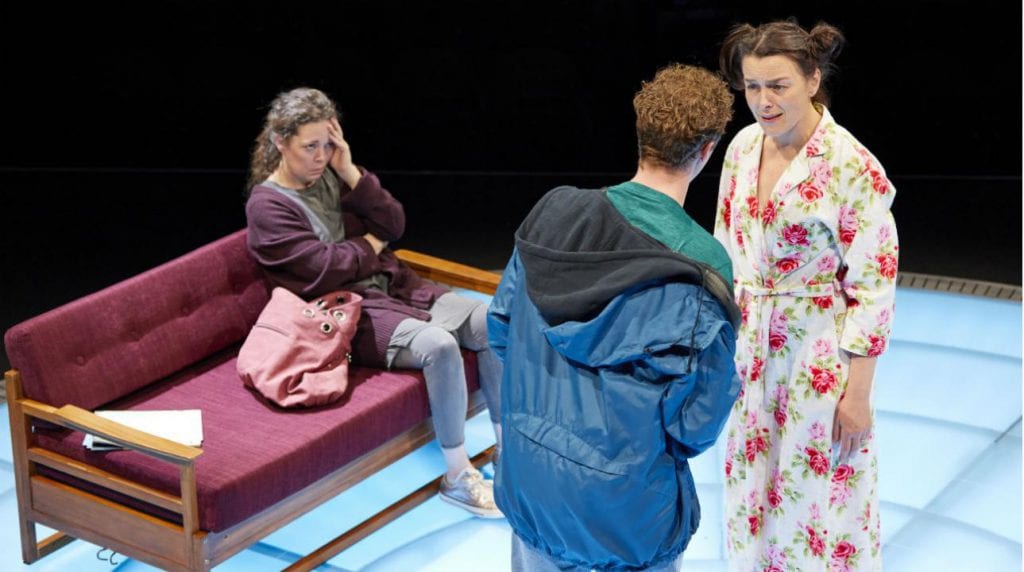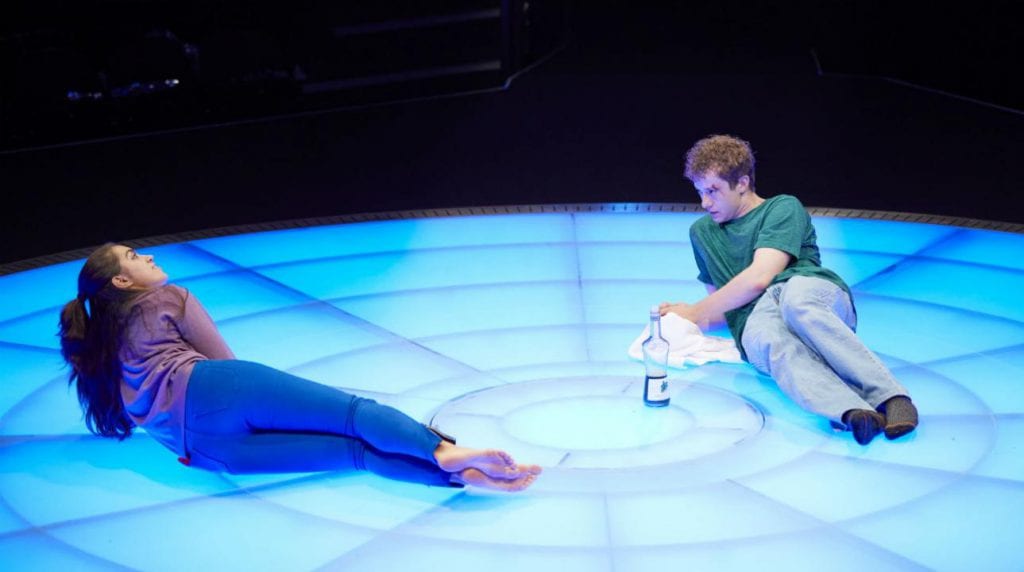2017 has been a rough year, so far; 2016 was no better. Brexit, Trump, wars and climate change are all making the world feel less and less stable. It is apt, then, that the National Theatre has chosen to option a production about collisions and destruction. In the inestimable Lucy Kirkwood’s stunning new play, two very different sisters clash as the world around them grows ever more uncertain. Kirkwood’s piece overflows with ideas, but she manages to catch the disparate threads and weave them into a wonderfully intricate whole.
Mosquitoes is set in Geneva at CERN, during the inaugural Hadron Collider tests in 2008, where scientists searched for the elusive Higgs Boson – or ‘God’ – particle. As scientists attempt to recreate the conditions of the Big Bang, and unravel the mysteries of the universe, two sisters grapple with problems on a more personal scale. Alice (Olivia Williams) is a physicist working on the collider in Switzerland, preparing for the most important moment of her career, whilst trying to be a mother to her brilliant (but difficult) teenage son, Luke (Joseph Quinn); Jenny (Olivia Colman) lives back in England, selling medical insurance and grieving the loss of her young daughter (to whom Jenny did not give the MMR vaccine). In the aftermath of her child’s death, for which Jenny blames herself, she travels to Geneva with their mother (Amanda Boxer) to spend time with her sister. When she arrives, tensions run high and the family threatens to collapse in on itself, creating a black hole of its own.
The central conflict of the play is between the personal and the scientific. Alice, for all her stratospheric intellect, cannot cope with the daily realities of life – she struggles to connect with her son; her first husband is long gone, and her new relationship with boyfriend Henri (Yoli Fuller) appears precarious at best; though similar to her mother (also an accomplished scientist) the two are distant, and grow farther apart as the play continues. Jenny is the inverse: though endowed with relatively little academic prowess, she has common sense in abundance, and often steps in when Alice steps back from problems. However, Kirkwood’s vision is contradictory and complex: Jenny’s science is not always cold and distant. In one glorious moment, Alice sits with her son Luke and shows him, on her laptop, the sound of the Higgs Boson particle decaying, which she and her team have managed to measure and record. The audience is met with a wave of gliding synths, juddering clicks, and what sounds like the wails of a distorted choir. Luke’s face lights up; so do ours. In this moment, particle physics really does seem to capture some higher essence of humanity that Jenny’s no nonsense approach to life cannot. Kirkwood’s views are nuanced – she is both suspicious of scientific progress, like Jenny is, and entranced by it, like Alice.
Olivia Colman and Olivia Williams shine in these respective roles. Neither are inherently sympathetic – Colman’s Jenny is impulsive and volatile, as jealous of her sister’s life as she is dismissive of it. As Alice, Williams is suitably aloof – a woman with her head frustratingly high up in the clouds but her heart firmly in the right place. As the sisters spar, we are pulled in different directions by this metaphorical tug-of-war – Colman and Williams ensure that we care deeply about them both, and are caught up in their collision. Elsewhere, Amanda Boxer is hilarious as the fussy, elderly mother, providing well-timed bouts of comic relief as well as searing moments of insight. Quinn’s portrayal of Luke is expert – whilst the quick fire dialogue between Colman and Williams is fierily compelling, his own exasperation with humanity at large is equally absorbing.
Kirkwood’s play is about ambition; it is about searching for what lies beyond. Every character lacks something: Luke pines after Natalie (Sofia Barclay), a school friend he has a crush on; Karen (Boxer) is losing her memory; Jenny has lost her daughter; Alice aims to find the most sought after particle in the universe. Kirkwood cleverly intertwines Alice’s search for the particle with the enduring significance of her absent ex-husband (Paul Hilton). Named ‘The Boson’ in the cast list, he drifts on the periphery of Alice’s consciousness, ubiquitous but translucent, too; like the particle, he remains a mystery – though Luke has been told that his father works for a secret government agency, even he seems sceptical of this explanation. The Boson is both absent and present; it is endowed with the ability to both create and destroy. During 2008’s tests, the media perpetuated very real worries that the experiments could malfunction and create a black hole, thus bringing about the end of the world. Kirkwood poses prescient questions concerning the human desire to know, to discover: Mosquitoes suggests that whilst knowledge is beautiful in and of itself, it can destabilise what lies immediately around it – it is a force of nature.
Mosquitoes is filled with circles: a circular stage; a circular rotating disk above it; Jenny’s spherical pregnant tummy. The Hardon Collider itself is circular, as are the particles colliding within it; so is planet earth. Kirkwood has constructed a drama of mesmeric, concentric circles, at the centre of which lies one dysfunctional family, threatening to implode. The effect is stupendous to watch. This is not just a play: this is a living, breathing organism.





